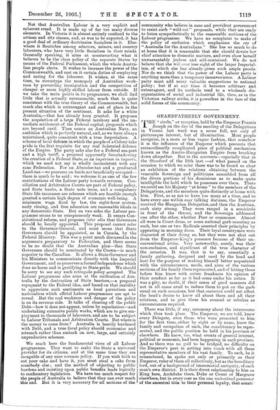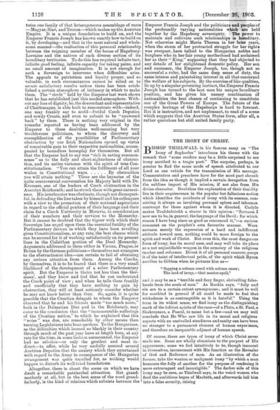GRANDFATHERLY GOVERNMENT. T HE "circle," or reception, held by the Emperor
Francis Joseph on the day of the meeting of the Delegations in Vienna last week was a scene full, not only of picturesque interest, but of illumination. Most people recognise, in a more or less vague fashion, that somehow it is the influence of the Emperor which prevents that extraordinarily complicated piece of political mechanism known as the Austro-Hungarian Empire from breaking down altogether. But in the accounts—especially that in the Standard of the 18th inst.—of what passed on the occasion to which we refer there was to be found so clear' an exhibition of the relations obtaining between the venerable Sovereign and politicians assembled from all the divers portions of his dominions as to make quite intelligible the hold which be possesses over them. Thera we could see his Majesty " at home " to the members of the Delegations, and the members quite distinctly at home with him. First, so as not to have too many at a time, and to have every one within easy talking distance, the Emperor received the Hungarian Delegation, and then the Austrian, each sixty strong. They were ranged in a semicircle in front of the throne, and the Sovereign addressed, one after the other, whether Peer or commoner. Almost all were in Court dress, or some national garb counting as such, but one or two Radicals asserted their principles by appearing in morning dress. Their loyal countrymen were disgusted at their doing so, but they were not shut out from the Emperor-King's presence because of their un-, conventional attire. Very noteworthy, surely, was their non-exclusion, and significant of the true character of the occasion. It was, that is to say, essentially a family gathering, designed and used by the head and host for the purpose of making himself better acquainted with the circumstances, needs, and aims of the various sections of his family there represented, and of letting those before him know with entire frankness his opinion of their conduct so far as it had come under his notice. It' was a pity, no doubt, if their sense of good manners did . not in all cases avail to induce them to put on the garb. usual on such occasions, but that omission could not affect the head's desire to know all about them and all their relations, and to give them his counsel or rebukes as circumstances required.
There was little, if any, ceremony about the intercourse. which thus took place. The Emperor, we are told, knew every Delegate, even those who were presented to him", for the first time, either by sight or by name, knew the family and occupation of each, the constituency lie repre- sented, and the public position he held in his province or elsewhere. He knew, too, what events of general interest, political or economic, had been happening in each province. And so there was no gulf to be bridged, no difficulty on the Emperor's part in getting into touch with all these' representative members of his vast family. To each, be it remembered, he spoke not only or primarily as their' Emperor, ruler of them all collectively, but as the hereditary lord, out of a background of immemorial antiquity, of each man's own district. It is their direct relationship to him as King here, Archduke there, Duke or Count or Margrave elsewhere, but in every case as the one undoubted possessor of the ancestral title to their personal loyalty, that consti. tutes one family of that heterogeneous assemblage of races —Magyar, Slav, and Teuton—which makes up the Austrian Empire. It is a unique foundation to build on, and the Emperor Francis Joseph has known exactly how to build on it, by developing—and that in the most natural and whole- some manner—the realisation of this personal relationship between the reigning member of the house of Hapsburg- Lorraine and the natives of each diverse section of its hereditary territories. To do this has required infinite tact, infinite good feeling, infinite capacity for taking pains, and no small amount of imagination. It is not enough for such a Sovereign to intervene when difficulties arise.
The appeals to patriotism and loyalty proper, and so valuable, in such circumstances cannot be relied on to secure satisfactory results unless there has been estab- lished a certain atmosphere of intimacy in which to make them. The " circle " held by the Emperor last week shows that he has established just this needed atmosphere. With- out any loss of dignity, he, the descendant and representative of Charlemagne, is able both to remonstrate with—indeed, one may frankly say to scold—fretful Czech Deputies and rowdy Croats, and even to submit to be "answered back " by them. There is nothing very original in the remarks reported as having been addressed by the Emperor to these doubtless well-meaning but very troublesome politicians, to whom the discovery and exemplification of the possibilities of Parliamentary obstruction by our Irish Nationalists opened up vistas of conceivable gain to their respective nationalities, accom- panied by boundless horseplay for themselves. But all that the Emperor had to say was "rich in saving common- sense " as to the folly and short-sightedness of obstruc- tion, and its entire variance with the spirit of true Con- stitutionalism. "You can attain the fulfilment of all your wishes in Constitutional ways By obstruction you will attain nothing." These are the keynotes of the quite controversial conversation his Majesty held with Dr. Kramarz, one of the leaders. of Czech obstruction in the Austrian Reichsrath; and he struck them with great earnest- ness. His interlocutor was obstinate, though not disrespect- ful, in defending the line taken by himself and his colleagues with a view to the promotion of their national aspirations in regard to the official position of their language and their claim for a Czech University in Moravia, in consideration of their numbers and their services to the Monarchy. But it cannot be doubted that the vigour with which their Sovereign has urged upon them the essential futility of the Parliamentary devices in which they have been revelling gives Constitutionalism, at any rate, the best chance which can be secured for it of working satisfactorily on its present lines in the Cisleithan portion of the Dual Monarchy. Arguments addressed to them either in Vienna, Prague, or Briinn by the German politicians—themselves not strangers to the obstructionist idea—are certain to fail of obtaining any serious attention from them. Among the Czechs, by themselves, it is to be feared that there is a very small likelihood of the development of a sober Parliamentary spirit. But the Emperor is theirs not less than the Ger- mans', and they know and feel that he can understand the Czech point of view ; and when he tells them frankly and unofficially that they have nothing to gain by obstruction, they will at least seriously consider whether he may not know better than they. So, again, it is quite possible that the Croatian delegate to whom the Emperor observed that he and his friends made " too much noise," both in the Dalmatian Diet and in the Reichsrath, may come to the conclusion that the "immeasurable sufferings of the Croatian nation," to which he explained that this " noise " was due, are remediable by other means than turning Legislatures into bear-gardens. To the Hungarians, as the difficulties which loomed so blackly in their country through much of the past year have at length been, at any rate for the time, in some fashion surmounted, the Emperor had no rebukes—or only the gentlest and most in- direct—to offer, while he very usefully assured several Austrian Deputies that the anxiety which they entertained with regard to the Army in consequence of the Hungarian arrangement was quite uncalled for, as nothing would happen to disturb its well-tried foundations.
Altogether, there is about the scene on which we have dwelt a remarkable patriarchal attraction. Not grand- motherly at all, but in the best sense of the word grand- fatherly, is the kind of relation which subsists between the Emperor Francis Joseph and the politicians and peoples of the profoundly varying nationalities which are held together by the Hapsburg sovereignty. The power to maintain and cultivate such relationships is hereditary. Not otherwise might Maria Theresa in her later years, when the storm of her protracted struggle for her rights was overpast, have talked to the Hungarian nobles and burghers who in her fair young motherhood had acclaimed her as their " King," supposing that they had objected to any details of her enlightened domestic policy. Her son and successor, the Emperor Joseph, too, though not so successful a ruler, had the same deep sense of duty, the same intense and painstaking interest in all that concerned the welfare of his subjects. By the exercise of like qualities, lit up by a singular governing instinct, the Emperor Francis Joseph has turned to the best uses his unique hereditary position, and has given his uneasy combination of nationalities the best chance of continuing to constitute one of the Great Powers of Europe. The future of the complex heritage of the Hapsburgs is hard to forecast. But it is instructive, and not unpleasant, to read of a scene which suggests that the Austrian States form, after all, a rather querulous but still united family party.







































 Previous page
Previous page